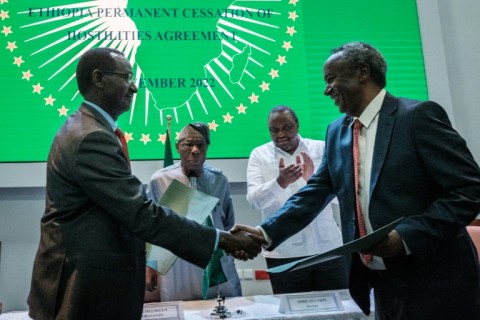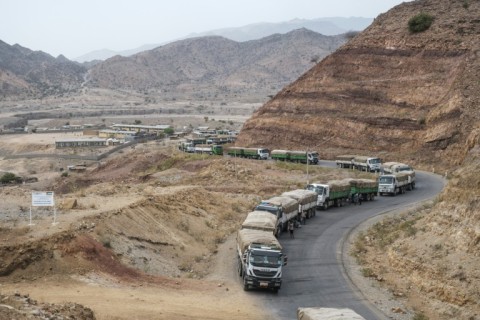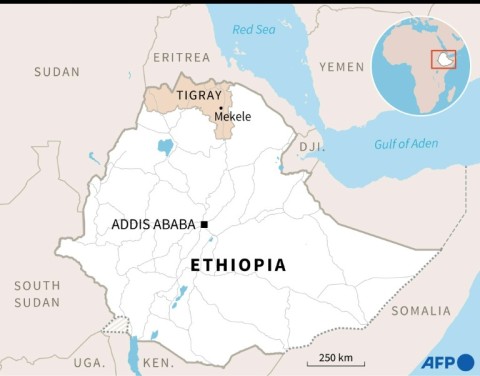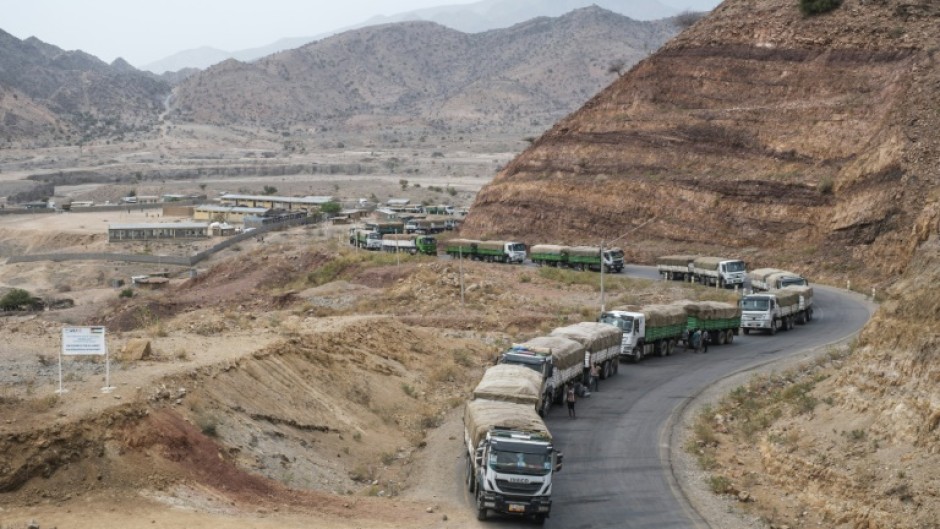
ADIS ABABA - Ethiopia's government and Tigrayan rebels agreed on Saturday to facilitate immediate humanitarian access to "all in need" in war-ravaged Tigray and neighbouring regions.
The agreement followed talks in the Kenyan capital Nairobi this week on the full implementation of a deal signed between the warring sides 10 days ago to end the brutal two-year conflict in northern Ethiopia.
"The parties have agreed to facilitate unhindered humanitarian access to all in need of assistance in Tigray and neighbouring regions," according to a joint statement read out at a Nairobi press conference.
The agreement was signed by Field Marshal Berhanu Jula, Ethiopian armed forces chief of staff, and General Tadesse Worede, commander-in-chief of the Tigray rebel forces.
African Union special envoy Olusegun Obasanjo, who has been mediating the peace negotiations, said Saturday's deal was with "immediate effect".
The two sides have also agreed to establish a joint committee to implement an agreement to disarm fighters with the Tigray People's Liberation Front (TPLF), the statement said.
The African Union Commission said it "applauds the parties on these significant confidence-building measures and encourages them to continue towards the full implementation of the Cessation of Hostilities Agreement, as part of overall efforts to end the conflict and restore peace, security and stability in Ethiopia".
After little more than a week of negotiations in the South African capital Pretoria, the government of Prime Minister Abiy Ahmed and the TPLF on November 2 signed a peace deal which has been hailed by the international community as a crucial first step in ending the bloodshed.
'Untold misery'
The restoration of aid to Tigray and its six million people was one of the key planks of the accord.
Ethiopia's northernmost region is in the grip of a severe humanitarian crisis due to lack of food and medicine, and there is limited access to basic services including electricity, banking and communications.

"We have suffered untold misery over the last two years and still continue to suffer," Tadesse said. "So the commitment we are making today is with the hope that our people's suffering will come to an end soon".
Berhanu pledged the government's "full commitment for bringing peace and stability to our people and our country".
International pressure for a ceasefire had been mounting since intense fighting erupted in late August, shattering a five-month truce that had allowed limited aid to reach Tigray.
The Pretoria deal notably calls for the cessation of hostilities, restoration of humanitarian aid, the re-establishment of federal authority over Tigray and the disarming of TPLF fighters.
The conflict between the TPLF and pro-Abiy forces, which include regional militias and the Eritrean army, has caused an untold number of deaths, forced more than two million people from their homes and driven hundreds of thousands to the brink of famine in Tigray.
Estimates of casualties vary widely, with the United States saying that as many as half a million people have died, while the EU's foreign envoy Josep Borrell said that more than 100,000 people may have been killed.
UN-backed investigators have accused all sides of committing abuses but also charged that Addis Ababa had been using starvation as a weapon of war -- claims denied by the Ethiopian authorities.

Abiy declared last week that his government -- whose forces had claimed considerable gains on the Tigray battlefield in recent weeks, had secured "100 percent" of what it had sought in the peace negotiations.
On Friday, the government said its forces controlled 70 percent of Tigray and that aid was being sent in, including 35 trucks of food and three trucks of medicine to the strategic city of Shire.
But the rebels and a humanitarian worker based in Tigray swiftly denied the claims.
On Wednesday, the World Health Organization called for a massive influx of food and medicines into Tigray following the ceasefire deal, saying aid had not yet been allowed in.
"Many people are dying from treatable diseases. Many people are dying from starvation," WHO chief Tedros Adhanom Ghebreyesus, who hails from Tigray, told a press conference.
Abiy -- a Nobel Peace Prize laureate -- sent troops into Tigray on November 4, 2020 to topple the TPLF, the region's ruling party, in response to what he said were attacks by the group on federal army camps.
The conflict capped months of simmering tensions between Abiy and the TPLF which had dominated the national government for almost three decades until he took office in 2018

